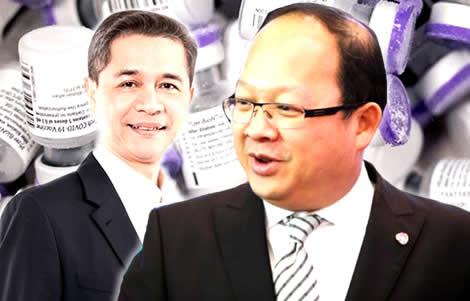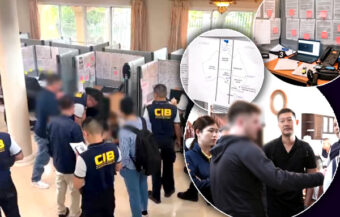Government’s handling of the vaccination campaign is being openly criticised for being too short-sighted and lacking ambition. One analyst has said the government can have ‘no excuses’ for failing to deliver the required vaccine doses to reopen on time as other countries in Southeast Asia have managed to do.
Top Thai business leaders are urging the government’s economic team to prioritise the procurement of vaccines no matter how high the cost may be to deal with the current escalating Covid-19 virus wave in the kingdom even where this means putting that goal ahead of priming the economy. It comes as a senior researcher with a leading think tank is warning that it could be 4 to 6 months before this current virus wave is brought under control while a top security analyst says the government’s plan to vaccinate the main segment of the adult population from August is simply too slow.

Leading Thai business figures are urging the government to adopt a decisive approach to the third and most dangerous wave of the Covid-19 virus which threatens Thailand with a potentially deeper economic crisis than it faced last year.
Most agree that the government of Prime Minister Prayut Chan ocha must loosen the purse strings and breach the legal 60% of GDP limit set by law for public debt while all agree that the priority must be in speeding up the procurement of vaccines at any cost.
Senior analyst at Bangkok based research institute says it may take 4 to 6 months to control according to testimony from epidemiology experts
It comes as Nonarit Bisonyabut a senior researcher at the Bangkok based Thai Think Tank, the Thailand Development Research Institute (TDRI), has predicted that this virus wave could take four to six months, based on the evidence of expert epidemiologists, to bring under control.
‘The third wave is serious, setting highs for new infections and deaths. We are still unsure whether or when the government will be able to contain the outbreak,’ he said this week.
Financial supports for vulnerable businesses and those impacted by another domestic downturn
Like other economic experts, he is suggesting the government immediately introduce financial support for small and medium-sized firms, those involved in the informal sector and individuals who are most vulnerable.
The problem for the Thai government is the period may be longer than the previous two waves even without broad lockdowns of the economy as the public itself imposes its own self lockdown as the threat of the virus rises with record levels of infections and deaths.
Disbursement of government funds has been sluggish
Most experts have noted that the government has been careful or even sluggish about committing the funds it earmarked last year to protect the economy against this virus.
Last year, the kingdom ended with a public debt figure of 53% of GDP compared to, for instance, the United Kingdom now emerging successfully from the Covid-19 crisis, which had a public debt to GDP ratio of 99.4% compared to 115%, for instance, for France.
Figures released by the National Economic and Social Development Council (NESDC), in February, showed that only ฿748.7 billion of a ฿1 trillion emergency fund established last year had been allocated as of February 15th with only ฿404.6 billion actually spent or applied to the economy.
Economic difference in the profile of consumer expenditure and savings between Thailand and western countries will impact the outcome here
Another key difference between Thailand and western countries, which are now slowly emerging from the Covid-19 crisis, is that personal savings rates in western countries have gone up even for the less well off.
This has prompted some anticipation of a ‘pent up demand’ economic rebound in those countries as the crisis begins to recede.
However, for Thailand, the crisis has seen household debt, driven by the less well off and the vulnerable, skyrocket to levels not seen before or since records began.
The difference is the nature of the economies with Thailand having a huge off the book, informal and unrecorded sector while also having very little in the way of comprehensive social welfare supports.
Nevertheless, there is a similar pattern with banks in Thailand also recording rising and burgeoning bank account deposits since the crisis began as in financial institutions the world over.
Thai Deputy PM and Economics Czar urged the public to use money from their savings to boost the economy during the third wave as bank deposits surge
This is the situation which prompted Deputy Prime Minister Supattanapong Punmeechaow recently to urge Thais to use their savings to drive the economy forward, a call which was met with some scepticism as his critics said it showed a lack of understanding for the less well off in Thailand, many of whom have no income at this time with many being unemployed since April 2020.
A recent statement by the Deputy Governor of Phuket, Pichet Panapong, to a public meeting on the island in late March clarified that without government supports or a reopening of the island to unrestricted foreign tourism, a prospect that has now receded, the average monthly income would fall to ฿2,000 per month.
Plan to reopen Phuket to foreign tourists on July 1st
Despite this, the economic ‘czar’ insisted that the growth of funds and rising deposits within the Thai banking system was real. He pledged that the government would do something to incentivise those who control it to spend and pump it into the system.
The situation was explained succinctly by Amonthep Chawla the Head of Economic Research with CIMB Thai Bank.
‘Middle- and lower-income groups are suffering severely while the impact is less heavy for high-income and wealthier people,’ he explained. ‘The self-employed and small-business owners may have little spare cash, while salary-earners and the high-income group may still have funds to spend.’
Imbalanced and less developed economy has caused the virus to hit Thailand, in socio-economic terms, harder than developed western countries
This situation clearly underscores the lopsided and imbalanced nature of the Thai economy and the level of inequality which has been exacerbated by the pandemic since early last year.
This was something referenced recently by the Bank of Thailand which, while it assured the public that there was adequate liquidity within the banking system, warned that there were problems in some sectors.
The closure of the country to foreign tourism has contributed greatly to this impact causing the loss of up ฿2 trillion a year alone since April 2020.
Vaccines are more important now than economic stimulus says Federation of Thai Industries official
However, even economic support should not be the highest priority now according to the Vice Chairman of the Federation of Thai Industries, Kriengkrai Thiennukul.
‘This is not the right time to stimulate the economy. We need to control the outbreak first,’ he urged this week, pointing out that the key priority must be to procure vaccines.
His outlook was confirmed by Tassapon Bijleveld of Asia Aviation the company behind Thai Air Asia who explained that while companies like his can deal with the unique challenge of this pandemic, small business enterprises and those who are less well off, cannot.
‘Large companies like Thai AirAsia are not as much of a concern because we have more capabilities to maintain our business,’ he explained. ‘But SMEs and those living hand-to-mouth need an urgent remedy.’
Airline boss says government must pay whatever it takes to get vaccines at whatever cost to restart Thailand and protect people from the disease
However, he urged the government to procure more vaccines even at the highest cost to the state, still presenting this course of action as the most cost-effective way to deal with this pandemic right now.
Pipat Luengnaruemitchai is the Chief Economist with Kiatnakin Phatra Securities in Bangkok.
His analysis implies unavoidable criticism of the Thai government for getting the vaccination campaign wrong.
August is too late to begin vaccinating the bulk of the adult population says a financial analyst in Bangkok
Many business professionals now find themselves making the same point that opposition activist, Thanathorn Juangroongruangkit, the former leader of the now-dissolved Future Forward Party who railed against the government last year about its failure to widen the scope of vaccine procurement.
‘This suggests the government has failed in crisis management by depending too much on one vaccine brand, AstraZeneca, and one production plant in Thailand,’ Mr Pipat said this week. ‘The Thai government has no excuses as other countries have bet on many vaccine brands and are now proving they can manage risks much better than Thailand.’
Mr Pipat points out that it will be only after August when the main segment of the adult population of Thailand will begin to be vaccinated against Covid-19. He says this is simply too late.
Some concern over the government’s late scheduled vaccination programme as more vaccines are still going to be required than are currently secured
The economic analyst also worried that there are still not enough vaccines to even fulfil this less than ambitious goal.
‘The country needs about 120 million doses this year, while the government initially planned to secure 63.5 million doses,’ he points out.
Supporters of the government’s response point to timely financial supports in the first two waves
Supporters of the Thai government’s response argue that it responded to the challenges faced by the first and second wave in a timely manner just like other countries around the world.
Director of the Fiscal Policy Office, Ms Kulaya Tantitemit, said this week: ‘State measures to combat the impact of the outbreaks are extensive and not significantly distinctive from the aid measures introduced by other countries.’
At the same time, Thai Chamber of Commerce boss, Sanan Angubolkul has also defended the timely response last year.
‘The state actions were not slow. The government launched relief measures during the 2020 lockdown and introduced stimulus packages in September and October.’
Lack of vision failed to appreciate the efficacy of the vaccines which are now the only hope for Thailand
However, no matter what way you look at it, the government’s lack of vision when it comes to the efficacy of the Covid-19 vaccines as the ultimate solution to the challenge is what leaves it in the current unenviable predicament of a still escalating third and more devastating virus wave with a diminishing chance of the country returning to normal in 2021.
The extra money that might have been required to be spent on a wider array of admittedly more expensive vaccines would, in hindsight, have been money well spent given the bill that now presents itself.
Of course, judging things in hindsight is less than fair especially considering the speed and unorthodox nature of the development of the current range of vaccines and the controversy that, even still, surrounds them. Foresight always trumps hindsight in these situations.
Top virologist urges Thais to embrace vaccines as the road back to normal
However, even from February, Dr Yong Poovorawan, the kingdom’s hawkish virology expert when it comes to the population’s safety, was highlighting vaccines as the final solution to this crisis: ‘As many Thais as possible should get vaccinated to create a strong immunity, which would help return the outbreak situation to normal as soon as possible,’ he declared on Monday 22nd February.
It is still not too late for foresight to prevail.
Join the Thai News forum, follow Thai Examiner on Facebook here
Receive all our stories as they come out on Telegram here
Follow Thai Examiner here
Further reading:
Thailand may face a ‘real crisis’ as 3rd virus wave fails to slow amid record deaths says top doctor
PM Prayut hands power back to the CCSA to find 100 million vaccine doses to defeat Covid-19
Thailand scrambles to procure more vaccines as infections and deaths from Covid-19 jump sharply
Executive with Thai Air Asia shareholder firm warns that the virus downturn has wreaked havoc
Officials turn to hotels for more scarce hospital beds but say the 3rd wave can be defeated in May
Still time to avoid lockdown says Health Minister as 3rd virus wave dwarfs all infections to date
Fears that a 3rd wave of Covid-19 may have begun in Thailand with top doctors raising the alarm
Centre for Covid-19 announces ‘bubble and seal’ measures after October 1st with quarantine lifted
Top docs say vaccine jabs are safe after Thai PM’s jab is cancelled for the second time in two weeks
Vaccination campaign begins in early morning jab event but hopes for more foreign tourists set back
Economy to rebound as the year progresses driven by exports and a return of mass foreign tourism
Door closing on quick foreign tourism return as economic recovery is delayed to the end of 2022
Top Thai official says vaccine passports are legally a matter for the WHO under international law
Fact – only 6,556 visitors arrived in Thailand last month compared to 3.95 million in December 2019
Desperate foreign tourism business concerns are clinging to straws as they try to survive the crisis


















